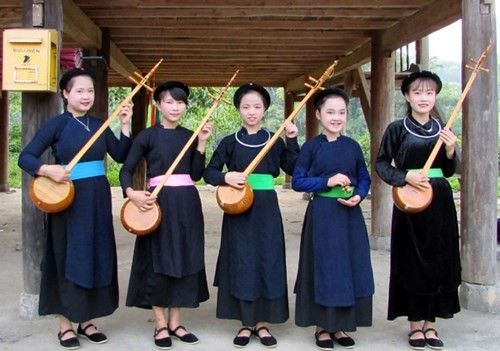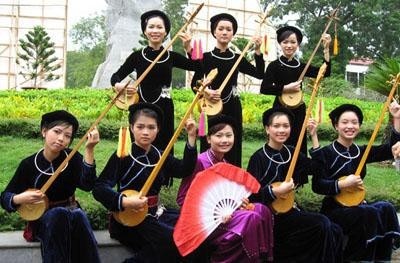According to Luu Dinh Bao, a 78-year-old “Then” master in the northern mountainous province of Bac Kan with 38 years of practicing the art form, “Then” singing is key part of the spiritual and cultural values of the Tay, Nung and Thai ethnic people.
“I’m very delighted to see the practice of “Then” singing recognized by UNESCO. This is an honor for us and gives us motivation to promote it and pass it on to the next generation, or else it will disappear someday,” said Bao.
 (Photo: vngo.vn) (Photo: vngo.vn) |
Ma Trung Truc is a “Then” singer who lives near Ba Be lake in Bac Kan province. Truc has become well-known for his warm voice and skillful hands in playing the Tinh, a typical string instrument accompanying “Then” singing. He has established clubs of “Then” singing and playing the Tinh. People interested in “Then” singing can attend classes organized by him and his wife in their stilt house.
"As a person who has always tried to keep “Then” singing alive, I’m so happy to see younger people interested in this special art form. This is a great motivation and also a duty for me to pass on my knowledge to the younger generations," said Truc.
 Then musicians Then musicians |
Lang Son is one of the cradles of the “Then” singing with around 100 “Then” singing clubs established by the Association for the Preservation of Folk Singing across the region. UNESCO’s recognition calls for much greater efforts to protect and develop this intangible heritage of humanity, according to Phan Van Hoa, deputy director of the Lang Son provincial Department of Culture, Sports, and Tourism.
"This great honor also means more responsibilities. It is our task to provide appropriate and timely guidelines for the local cultural agencies and organizations to practice, protect, and promote “Then” singing," said Hoa.
People’s Artist Trieu Thuy Tien, Vice Chairwoman of the Lang Son Association of Folk Singing Preservation, said she and her colleagues are working hard to bring “Then” singing to Hanoi dwellers. Tien told VOV: "Bringing Then singing to the capital’s streets is one of our goals. Hanoi people’s and foreign visitors’ warm response to such performances is evidence that “Then” singing has been successfully promoted more widely."